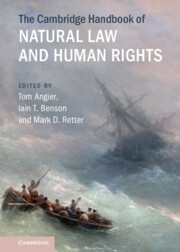Book contents
- The Cambridge Handbook of Natural Law and Human Rights
- The Cambridge Handbook of Natural Law and Human Rights
- Copyright page
- Contents
- Contributors
- Acknowledgements
- Introduction
- Part I Natural Law and the Origins of Human Rights
- Part II Natural Law Foundations of Human Rights Obligations
- 8 Ontological and Epistemological Foundations of Human Rights
- 9 The Teleological Foundations of Human Rights
- 10 New Natural Law Foundations of Human Rights
- 11 A Personalist Foundation for Natural Law and Human Rights
- 12 Acknowledged Dependence, Natural Right, and Human Rights
- 13 Eternal Law, Natural Law, Natural Rights
- Part III Natural Law and Human Rights within Religious Traditions
- Part IV The Human Person, Political Community, and Rule of Law
- Part V Rival Interpretations and Interpretive Principles
- Part VI Challenges and Future Prospects
- Index
11 - A Personalist Foundation for Natural Law and Human Rights
from Part II - Natural Law Foundations of Human Rights Obligations
Published online by Cambridge University Press: 03 November 2022
- The Cambridge Handbook of Natural Law and Human Rights
- The Cambridge Handbook of Natural Law and Human Rights
- Copyright page
- Contents
- Contributors
- Acknowledgements
- Introduction
- Part I Natural Law and the Origins of Human Rights
- Part II Natural Law Foundations of Human Rights Obligations
- 8 Ontological and Epistemological Foundations of Human Rights
- 9 The Teleological Foundations of Human Rights
- 10 New Natural Law Foundations of Human Rights
- 11 A Personalist Foundation for Natural Law and Human Rights
- 12 Acknowledged Dependence, Natural Right, and Human Rights
- 13 Eternal Law, Natural Law, Natural Rights
- Part III Natural Law and Human Rights within Religious Traditions
- Part IV The Human Person, Political Community, and Rule of Law
- Part V Rival Interpretations and Interpretive Principles
- Part VI Challenges and Future Prospects
- Index
Summary
This chapter argues that there are two key errors in the classical natural law tradition: first, that the ultimate end of all human actions is happiness instead of doing justice and loving the intrinsic good for its own sake; second, that our relationship to the good consists above all in desiring it, instead of giving goods an adequate response of will and heart. Grounding natural law on natural inclinations in this way commits the naturalistic fallacy: the moral ought is derived from facts about human desires. Drawing on realist phenomenology, the chapter secures natural law and human rights with an account of intrinsic objective values perceived by human reason. The intrinsic and objective value, or dignity, of human persons grounds a strict ethical obligation (natural law) to respect that dignity, and act with an appropriate value response. The appropriate value response is the object of a person’s fundamental human rights. The scope and hierarchy of human rights proceeds from this ethical obligation to respect human dignity in its various manifestations: ontological dignity, the dignity of conscious and rational persons, acquired dignity and bestowed dignity.
Keywords
- Type
- Chapter
- Information
- The Cambridge Handbook of Natural Law and Human Rights , pp. 160 - 174Publisher: Cambridge University PressPrint publication year: 2022

